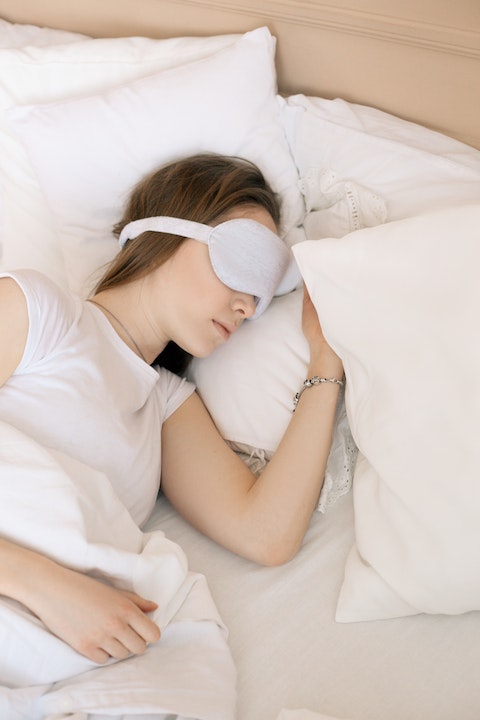
Until the 1950s, many people considered sleep a passive, dormant part of their daily lives. Now, we know that our brains are very active while we sleep. We are just beginning to understand how sleep affects our daily functioning and physical and mental health. In this article, we will tell you how to fall asleep.
Neurotransmitters, which control which neurons are awake or asleep in the brain, act on different groups of nerve cells or neurons. During waking hours, brainstem neurons release neurotransmitters such as serotonin and norepinephrine, keeping certain brain regions active.
When we sleep, other neurons at the base of the brain begin to signal. Our brains seem to turn off the signals that keep us awake when these neurons fire. Researchers have also found that a chemical called adenosine builds up in our blood while we are awake and causes drowsiness. As we sleep, the chemical gradually disappears.
Sleep is a naturally recurring state of mind and body, characterized by altered consciousness, relatively inhibited sensory activity, reduced muscle activity and inhibition of nearly all voluntary muscles during rapid eye movement (REM) sleep, and reduced interactions with surroundings. It is distinguished from wakefulness by a decreased ability to react to stimuli, but more reactive than a coma or disorders of consciousness, with sleep displaying different, active brain patterns.
https://en.wikipedia.org/wiki/Sleep
How to fall asleep: Why Do We Need a good Sleep?
Surviving
studies on mice indicate sleeping is necessary for survival. Mouses typically live for two to three years, but those deprived of sleep live for about five weeks. Sleep-deprived rats also exhibit abnormally low body temperatures, and Their immune systems may be impaired due to sleep deprivation.
Maintaining the Nervous System
It appears that sleep is necessary for our nervous systems to function correctly. We feel tired and incapable of concentrating the next day when we don’t get enough sleep. In addition, it impairs memory and physical performance and reduces the ability to perform math calculations. Hallucinations and mood swings are likely to develop if sleep deprivation continues.Researchers believe sleep gives neurons used while we are awake a chance to rest and repair. Neurons may become so exhausted or polluted from normal cellular activities that they malfunction without sleep. The brain may also benefit from sleep by strengthening neuronal connections that might otherwise weaken due to inactivity.
Keeping Us Growing
Children and young adults release growth hormones during deep sleep. The body’s cells also display an increased production and reduced breakdown of proteins during deep sleep. Because proteins play a crucial role in cell growth and repair from factors like stress and ultraviolet rays, deep sleep may be “beauty sleep.”
Research suggests that deep sleep may help people maintain optimal emotional and social functioning while awake due to reduced activity in parts of the brain that regulate emotions, decision-making processes, and social interactions.
Fall asleep fast by following these steps.

Decrease the temperature.
As you sleep, your body temperature changes. When you lie down, your body cools down. If your room is too hot, you might have trouble falling asleep. Set your thermostat between 60 and 67 F (15.6 and 19.4°C). Bathing or showering in hot water can help the body change its temperature faster. The brain’s cooling down afterward may signal it to sleep.
According to a literature review, you are taking a hot bath or shower before bed can increase sleep efficiency and quality.
Get on a schedule.
Many people find it easier to fall asleep when they set a sleep schedule.
The circadian rhythm is the body’s regulatory system. The internal clock allows you to feel alert and sleep at night during the day.
Your internal clock will keep a regular schedule if you wake up and go to bed simultaneously each day.
Once your body becomes accustomed to this schedule, you’ll have an easier time waking up and going to bed.
You should also get seven to nine hours of sleep each night. It has been shown that this is the ideal amount of sleep for adults.
Experience both light and darkness.
Light affects your body’s internal clock, which controls sleep and wakefulness.
Irregular light exposure can disrupt circadian rhythms, making it harder to fall asleep and stay awake.
Exposing your body to bright light during the day keeps it alert. Light from an e-reader or natural daylight enhances alertness.
The dark promotes sleepiness at night. Studies show that darkness boosts melatonin production, an essential hormone for sleep. During the day, the body produces very little melatonin.
Throughout the day, expose your body to sunlight or artificial bright light. At night, use blackout curtains to make your room dark.
Use yoga, meditation, and mindfulness as part of your daily routine.
People who are stressed tend to have trouble falling asleep. Relax the body and mind with yoga, meditation, and mindfulness. In addition, these practices improve sleep.
Through the practice of breathing patterns and body movements, yoga releases stress and tension accumulated in the body.
According to research, yoga can improve sleep parameters such as quality, efficiency, and sleep duration.
Meditation can enhance melatonin levels and aid the brain in achieving a state of relaxation that makes sleeping easier.
Finally, mindfulness can help you focus on what is happening, fall asleep faster, and function better during the day.
Using one or all of these techniques can help you sleep better at night and wake up feeling refreshed.
Don’t look at your clock.
Getting up in the middle of the night is typical. However, the inability to fall back asleep can ruin a good night’s sleep.
The person who wakes up in the middle of the night usually watches the clock and obsesses about not sleeping again.
People with insomnia often watch the clock. This behavior may exacerbate sleeplessness.
Furthermore, if you wake up regularly without falling back asleep, your body will develop a routine. As a result, you may wake up at all hours of the night.
Whenever possible, it’s best to remove the clock from your room. You can turn the clock, so you don’t have to look at it when you wake up in the middle of the night if you need an alarm in the room.

Watch when and what you eat.
A person’s diet before going to bed may affect their sleep. Researchers have found that high-carb meals may prevent you from getting a good night’s sleep.
According to a review of studies, even though a high-carb diet can get you to sleep faster, it won’t be restful. A high-fat diet could instead result in a deeper and more restful sleep.
Several older and newer studies agree that low-carb/high-fat diets have significantly better sleep quality than high-carb/low-fat diets.
Low-carb/high-fat diets had the same calories as high-carb/low-fat diets. Even if you are going to eat a high-carb meal for dinner, you should eat it at least 4 hours before bed.
Try aromatherapy.
Aromatherapy involves using essential oils. Many people who struggle with insomnia practice this technique to help them relax.
The use of aromatherapy improves sleep quality according to a systematic review of 12 studies.
The following scents have positive effects on sleep:
• Lavender
• Damask rose
• Peppermint
Although essential oils can be used in various ways, many sleep studies focus on inhalation aromatherapy.
Using a diffuser, you can infuse your room with the relaxing scent of essential oils.
Read something.
Before you go to bed, reading might be an excellent way to wind down. It seems that bedtime reading may promote a longer sleep.
Reading an e-book is different from reading a paper book, however.
Blue light from electronic books reduces melatonin production. Sleeping with low melatonin levels makes you feel tired the next day and makes it hard to fall asleep.
Thus, it’s recommended that you read from a physical book to relax and sleep better.







